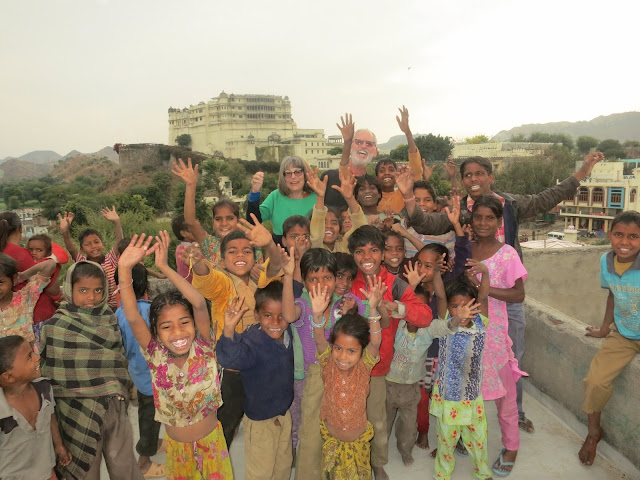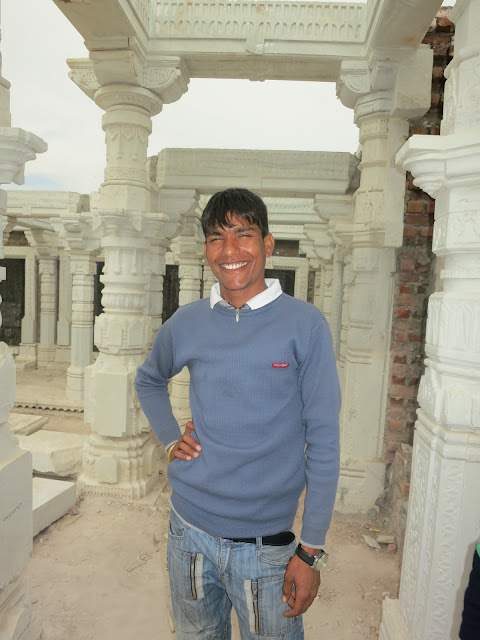Today was the last of the five days of the Jaipur Literary
Festival. We are exhausted but happy. It was incredibly stimulating. We have
met authors and readers from all over the world. We have been exposed to views
that in America you would never hear.
The day started with Simon Singh, who has written many
scientific books. He is amazingly articulate. This session was on his book: The
Big Bang, where he attempts to explain the big bang theory of the cosmos. He
actually made it sound interesting as he followed the original idea and its
subsequent adoption. His explanation of the Scientific Method was especially
interesting to me. Basically w a
strong theory is defined by its ability to predict. In the case of the
Big Bang Theory it predicted microwaves would be everywhere in space. Years
later, microwaves were discovered in space. This lends credence to the theory,
which is now generally accepted. His session was wonderful.
The Finkler Question featuring Howard Jacobson was next. I
have read this very Jewish Book, and really liked it. Unlike a previous panel
that he was on, Jacobson was less jokey (although very funny) and more serious.
It is difficult to tell where his act ends and the real Jacobson starts, but I
suspect it is a continuum. He
states he loves being like an old time prophet, proclaiming doom is near. He
feels that a book should speak for itself, and the author should not be seen,
yet he likes doing these events. We all live in dichotomies I suppose. To him
the story is subordinate to the sound and development of the sentence and the
language.
He said he didn’t feel at home in the world, and felt shame
and humiliation. When he did, he wrote about it and he felt it gave him mastery
over the event. He talked about Jewishness, Israel and the Holocaust. He
especially feels that in the case of Israel some people think that the
Holocaust should make the Jews especially aware of how they treat the
Palestinians. He rejects this, by saying the Holocaust was NOT an education
course that makes you a good person. In the same vein, he bridles at the use of
the term of Fascists or Nazi in regard to Israel; he feels those terms are only
used to hurt. It was excellent session, with thought provoking ideas.
The next session was titled: Taming the Gods, Religion and
Politics. With a mixture of Muslims and non-Muslims it quickly became a
discussion (not resolved) of the question of Muslim Violence. This was a major
theme during the entire Festival. The theory that predominated in the session
was that one should respect the believer but not necessarily the belief. In
practice of course this is difficult because the question is who defines
respect, the speaker or the listener. This is not an academic exercise. One of
the speakers on a previous panel we attended had to leave the conference and
India because there is an arrest warrant for him based upon what he said at the
conference. India does not have complete freedom of expression like the United
States. Because there are major issues of religion and caste differences, the
constitution prohibits speech that is offensive to someone. So there is a huge
amount of censorship problem. People easily get offended and the government
intervenes to stop the speech (like movies or books) before they even are
published, to avoid problems.
The liberal western panelists felt the key issue should be
that violence should be stopped by the government, not the speech that precedes
or incites it. This morphed into a discussion of the question of is there such
a thing as a moderate Muslim, or are there degrees of Muslims from liberal to
very conservative, and then a separate category of violent people. Clearly in
the 20th century the vast majority of violence has been perpetrated
by China and Russia and Nazi Germany all who were non-Muslim and basically
atheistic.
The session then talked about religious nationalism and felt
there were only two choices: 1) Suppress it (and it will probably become
violent) or 2) Fight out in the political arena.
What needs to be separated is religious authority and
political authority. The worse violator of that would be Iran, but Israel was
also mentioned.
The panel was very well balanced and informed.
The next panel was on the acclaimed book, Mao’s Great Famine
by Frank Dikotter. This was an amazing discussion. Frank basically went into
China to the archives in various provinces and found the documentation of the
Great Leap Forward and the collectivization of the peasants. The data was
meticulously recorded but never reported. He spoke passionately about what he
found. He determined that approximately 45 million people died. This is
equivalent to ALL who died in World War II.
These deaths weren’t a result of a misguided attempt to
modernize the country. What he found was that these deaths were the deliberate.
He expected to find famine he found violence. Violence to eliminate the old,
the feeble, the weak, the elderly. Food was used as weapon, people didn’t
starve to death, they were deliberately starved to death. What happened was 20
times worse that what happened in Cambodia under Pol Pot.
It ended when Mao decided to end it, and he blamed it all on
his underlings. He took no responsibility. This was not a misguided policy of
Mao, but the policy. China is different today, but there is no recognition, no
museum of this horror. It is simply forgotten and not talked about.
No matter how many peasants have been lifted out of poverty,
Mao must be remembered as a mass murderer on the scale of Hitler or Stalin (or
even greater). This was a very powerful seminar, and I ordered his book, I
really want to read it.
The final session for us was a reading and discussion of the
book: “The File”. This is another book I will read. Timothy Garten Ash is a
professor and correspondent. For 10 years his research was in East Germany.
After the wall fell, he went back to Germany and found the secret East German
file that was assembled on him. He related how he then decided to research his
file and contacted his friends who secretly informed on him to secret police
and the secret police who recruited the informants. For the most part, there
wasn’t anger but rather a cathartic experience as he better understood the
subtle ways that even good people
can become corrupted by an evil government. The book is rather like the movie:
The Lives of Others.
His conclusion was in a totalitarian state that then becomes
liberated, the best course of action is to open the files so all can read them,
recognize that those that perpetrated evil will probably not be punished for
they will have fled with their ill gotten gains. The model is the Truth and
Recognition panels in South Africa and the way East Germany files were opened.
This is not an academic question he is currently advising the Burmese
Government on how they should open their files.
He spoke a lot about the data gathering. He used a term I
have never heard: Private Superpowers, to refer to Google and Facebook and how
much data they know about you. They know far more than any government. Right
now they only used it for targeted advertisement but if combined with
government authority it would be far more detailed then anything any government
has ever known about its people. In addition, not only do they know everything
about you, but there is such an abundance of information and sophisticated
analysis available that that can predict what you will do. That is the truly
scary part.
He summed it up by saying conversely, if you lived your life
as though you were always being watched, you might in-fact live a very good
life.
We returned to the hotel, exhausted, and had a lot of wine,
as we relaxed talking with the authors that are staying here at the Haveli.
Tomorrow morning we leave the hotel and drive 6 ½ hours into the Rajasthan
Desert to the Magical Fortress of Devi Ghar.




































